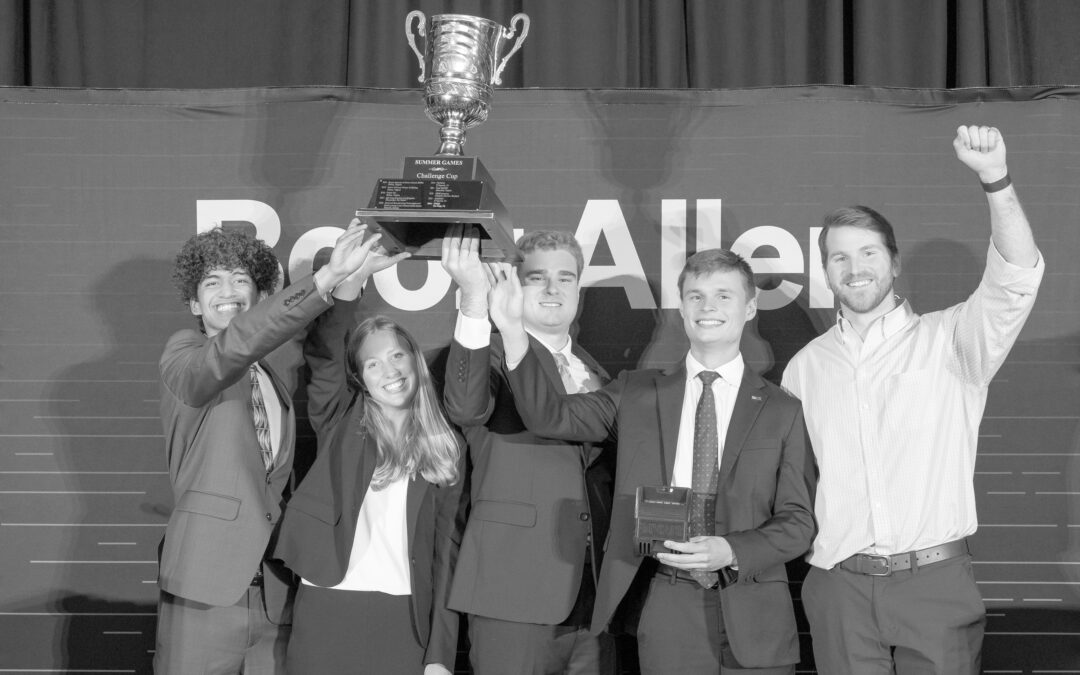CONTRIBUTED BY RACHEL WINGARD, AU NEWS
AUBURN — Anna Kate Boles, Gavin Lewis and Will Reynolds thought their summer internship with Booz Allen Hamilton in Huntsville would give them valuable experience in a real-world engineering environment. By summer’s end, they had a job offer, a pending patent and nationwide recognition as some of the brightest young engineers in the country.
Boles (industrial and systems engineering), Lewis (mechanical engineering) and Reynolds (aerospace engineering) are each expected to graduate in May and have the option to return to Booz Allen with a full-time job.
Booz Allen Hamilton is an advanced technology company that partners with major firms such as Google and Amazon Web Services to work with the Department of Homeland Security, the FBI and the Department of Defense.
Kuan Collins, Booz Allen’s vice president of Civilian Agencies, said the Summer Games internship is highly competitive and getting through the application process is not easy.
“We get thousands of applicants from all over the country,” she said.
The internship consists of more than 140 interns from across the country, divided into 34 teams. The Huntsville team — three Auburn engineering students and Joshua Soberano, an electrical and computer engineering student from Princeton University — won first place for their project.
The Product
The team created a drone that could operate in GPS and communications-denied environments. During research, the students spoke with the U.S. Army’s 101st Airborne Division and learned the military had a surplus of older drones slated to be replaced by newer models with better capabilities.
“Instead of just focusing on communications- and GPS-denied environments, we broadened our scope to create a retrofit kit that makes older drones autonomous,” Reynolds said. “We wanted to solve the problem of the military spending too much on new autonomous drones instead of upgrading existing ones.”
Collins said the team had to research what it meant to create a product that solved a real-world problem — and then, define the problem and their solution.
“That’s the best way to learn engineering — starting with a real problem and figuring out how to solve it,” she said.
Boles said the team divided the project based on their skills.
“I handled project management and did a lot of research on existing tech,” she said. “I also handled the financials and how to market the product.”
Lewis focused on the hands-on work.
“I handled wiring, soldering and assembling all the hardware components,” he said.
Reynolds worked on the flight control technology.
“We didn’t want the drone fully controlled by AI,” he said. “We still needed a manual override. I worked on the open-source autopilot software.”
The internship lasted 10 weeks, and after several rounds of trial and error, the team’s hard work paid off.
The Announcement
In the first round of the competition, all 34 teams presented their projects, and the Tiger Team advanced to the top five to present again on Day 2.
The final round of the competition took place in Washington, D.C., in front of top Booz Allen executives.
Boles was initially very nervous to be presenting in front of such a crowd.
“Fortunately, we had a great team and a good support system,” she said. “That helped me be able to present with confidence.”
When the dust settled, Auburn Engineering emerged as the winner.
“That moment was kind of surreal. Almost like we didn’t know what to do,” Boles said. “When we understood that we won, we all hugged and tried to live in the moment of what we had just accomplished.”
Collins said the team didn’t just win by creating a strong product — they developed something Booz Allen can patent and potentially bring to market.
The Experience
Boles said that as an industrial and systems engineer, she wasn’t initially sure what her role would be. But after working closely with engineers in other fields and leaning on her experience already learned at Auburn, she quickly realized her value to the team.
“Because of this experience, I’ve gotten more involved with model-based systems research at Auburn,” she said, “I wasn’t very aware of it before the internship, and now it’s something I can see myself doing.”
Lewis said the internship exceeded his expectations because he got to work on something meaningful and useful for the real world. More than making the product, he also made lifelong relationships from this experience.
“It was awesome to get an interdisciplinary view from working with other engineers,” he said. “We weren’t just co-workers; we became friends.”
Reynolds agreed, adding that the ten-week experience wasn’t just about the work.
“Our team hung out almost every day afterwards, so it was really fun,” he said. “The whole summer was the best I could’ve asked for as my last summer before starting my career.”
Collins said Auburn students are among the best in the country and that Auburn engineers graduate competent and confident in their skills — sometimes even before they graduate.
“Something about Auburn prepares them to show up and get noticed by the industry,” she said. “They show that they can be of value anywhere they go.”


